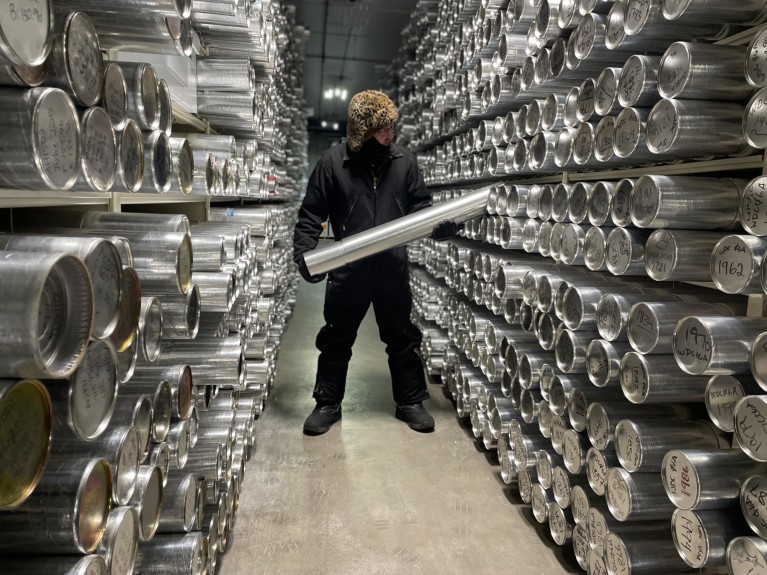Hello Nature readers, would you like to get this Briefing in your inbox free every day? Sign up here.
Ice-core containers are stacked high at the US National Science Foundation Ice Core Facility in Denver, Colorado.Credit: Curt LaBombard
Ancient-ice archive gets ‘future-proofed’
The refrigeration system that houses the largest collection of climate-tracking ice cores is about to slash its environmental footprint by switching away from banned ozone-harming coolants. The US National Science Foundation Ice Core Facility will transition from outdated hydrochlorofluorocarbon refrigerants to more efficient ‘transcritical’ CO2, which can behave as a liquid and a gas simultaneously.
Nature | 5 min read
Can bird flu spread through cow sneezes?
Cows can get infected with H5N1 avian influenza through the air— but this mode of transmission is probably not driving the current outbreak in the United States. Cows exposed to virus-laden mist through a mask produced neutralizing antibodies against the virus, confirming that they were infected. But the infected animals didn’t shed high levels of the virus in their airways, so experts don’t think it’s a major source of spread. “Udder-to-udder transmission still seems most likely to be the major route at present,” says virologist Thomas Peacock.
Nature | 5 min read
Reference: bioRxiv preprint (not peer-reviewed)
Dogs’ emotional sensitivity is baked in
Centuries of co-evolution seem to have led to dogs being able to sense our emotional states. When dogs were played the sounds of people crying or humming, they appeared more stressed by the sad sounds than by the neutral one. And they’re not just learning from being around us. Pet pigs — who were also raised alongside people but whose species played a very different role in human societies — seemed to find the humming more upsetting.
Nature | 4 min read
Reference: Animal Behaviour paper
Trump’s VP choice is a climate skeptic
Former US president Donald Trump’s choice of running mate in the presidential election, Senator J. D. Vance, is a strong backer of the oil and gas industry, has opposed support for renewable energy and electric vehicles and says he is skeptical of climate change. Like his view on Trump — which has changed from vocal critic to die-hard loyalist — it has not always been this way. “We have a climate problem,” said Vance in 2020. Last year, after seeking Trump’s support during his 2022 campaign for the senate, Vance criticized climate legislation as “green energy daydreams”.
The New York Times | 5 min read
Features & opinion
Don’t ignore alternatives to animal research
It’s been more than a year since the law in the United States changed to allow alternatives to animal research when testing drug candidates — but many scientists aren’t aware of the options, notes a Nature editorial. More studies using human tissue — induced pluripotent stem cells, organoids and tiny tissue samples taken from biopsies — could improve the outlook for researchers, patients and animals alike.
Nature | 6 min read
Thanks for everything
Science writer Tabitha Carvan is enchanted by the found poetry hidden in the acknowledgement sections of PhD theses. “They feel like they’ve been drafted a hundred times in the head of the author, but then put down on the page in a hurry,” writes Carvan. “Like they’re trying to tell you the most important thing they’ve ever said — at the very moment the ship is pulling away from the dock.” In this delightfully interactive feature, Caravan takes us on a tour of some of her favourites.
Australian National University College of Science | Leisurely scroll
